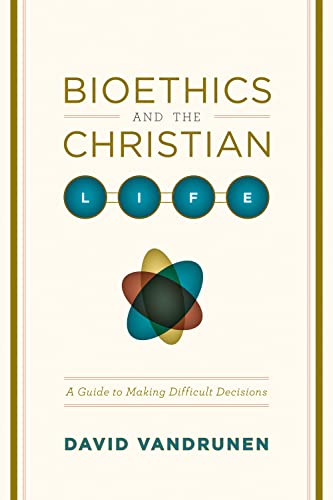Bioethics and the Christian Life: A Guide to Making Difficult Decisions
Written by David VanDrunen Reviewed By David B. FletcherAfter years of observing the attempt to do bioethics from a neutral and generic philosophical perspective, many thinkers are coming more and more to the conclusion that the best approach to addressing issues in bioethics is one that arises from a specific theological tradition. For a conservative Reformed approach to bioethics, one could hardly do better than to consult David VanDrunen, the Robert B. Strimple Professor of Systematic Theology and Christian Ethics at Westminster Seminary, California. VanDrunen tackles issues at the beginning and at the end of life, but only after laying a careful theological foundation that considers divine sovereignty, human nature and the image of God in humans, soul and body, sin, and suffering, along with the Christian virtues.
Of particular interest to this reviewer is his taxonomy of possible approaches to bioethics available to the Christian. VanDrunen identifies five possible ways to relate Christian and secular bioethics in one's methodology (“secular” here means not godless bioethics, but simply bioethics as done in the broader community):
(1) Secular Bioethics Only is seen in Tom Beauchamp and James Childress' common morality approach that is called “principilism,” as well as Robert Veatch's appeal to a broad social covenant.
(2) Christian Bioethics Only, as advocated by such thinkers as John Frame and Marsha Fowler, appeals solely to theological premises and guidelines found in Scripture.
(3) Secular and Christian Bioethics Identicalis promoted by many Roman Catholic ethicists such as Richard McCormick, Lisa Sowle Cahill, James Walter, and Thomas Shannon, who generally believe that the Catholic tradition illumines, clarifies, and reinforces moral truths that are known even apart from faith.
(4) Secular and Christian Bioethics Radically Different is championed by H. Tristam Engelhardt, who rejects secular ethics as lacking useful content while he champions the Eastern Orthodox tradition as a rich way to understand human beings in their bioethical situations.
(5) Secular Bioethics and Christian Bioethics Distinct but Legitimate sees Christian ethics as distinctive and rich, but also views secular ethics as “genuine and meaningful” (p. 28).He sees this approach in both Roman Catholic and Protestant thinkers, including Edmund Pellegrino and David Thomasma, particularly their works on virtues in medicine linked to the “internal morality of medicine” (p. 28), which is amplified and expanded by theological considerations. Among evangelical Protestants in this camp he lists John Jefferson Davis, Scott Rae, and Paul Cox, who encourage Christians to engage the public debate with arguments from general revelation to attempt to persuade nonbelievers, while holding that Christian revelation provides distinctive shape to Christian thinking. Joel Shuman and Brian Volck also belong in this category with their belief that modern medicine is among the powers ordained by God, yet is prone to abuse. VanDrunen as well advocates this fifth position.
VanDrunen's approach throughout is consistently practical, pastorally sensitive, and theologically grounded. His treatment of infertility and assisted reproduction is a fine example. He recognizes the puzzling moral predicaments infertile Christian couples face and offers a theological perspective on marriage, intimacy, and reproduction before suggesting that there is a distinctly Christian way to deal with the pain of infertility. He recommends the virtue of contentment, which must be sought before any medical remedies are pursued, with the church all the while bearing up the suffering couple. Courage and Christian stewardship are also called for. He believes that solutions that do not involve a third party (donor or surrogate) are morally superior, and he disputes the Roman Catholic claim that all reproduction must result from a conjugal act. He finds artificial insemination by the husband morally licit and believes that despite all the moral difficulties with IVF it could be permissible, but only when the couple is committed to bringing into the world each embryo implanted.
This book will repay close study by any Christian looking for solid biblical guidance in bioethics, either as a medical professional or as a patient.
David B. Fletcher
David B. Fletcher
Wheaton College
Wheaton, Illinois, USA
Other Articles in this Issue
Some of the most valuable and lasting contributions made to the Christian faith have come through Christian scholarship...
Music, singing and emotions: what are the connections? The question is by no means new, but it’s certainly one that has received renewed attention in recent times...
In his influential address, “Discourse on the Proper Distinction between Biblical and Dogmatic Theology, and the Right Determination of the Aims of Each,” Johann Philipp Gabler (1753–1826) lodged the programmatic proposal that scholars ought to distinguish between biblical and systematic theology...
One of the most unnerving things you can read is John Milton’s great poem Paradise Lost...
Since The Intolerance of Tolerance was published, readers have been sending me new examples they have spotted-examples of egregious intolerance masquerading in the name of tolerance...







